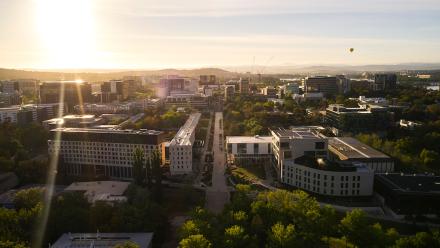Space law: the final frontier
Space law is really just the law which governs human activity in outer space.
As humankind reaches further and further towards the stars, space law is paving the foundations for the way we govern outer space, now and in the future. KATHARINE PIERCE reports in the new ANU Reporter.
Films and TV shows like Star Wars and Firefly make space seem like a pretty lawless place, with little regard for property, let alone human life.
So the term 'space law' might seem a futuristic concept to us, but with human beings becoming increasingly reliant on satellite technology and fostering grand dreams of inter-planetary travel, the concept is becoming more important than ever.
"Space law is really just the law which governs human activity in outer space," says fifth-year ANU College of Law student Joel Dennerley, who is currently studying space law as part of his honours thesis.
"It started roughly in 1957 with the launch of Sputnik when the international community decided it would be very prudent and important to regulate spatial activities because they represent such ultra-hazardous endeavours."
ANU at the forefront of space junk
The United Nations Committee on the Peaceful Uses of Outer Space and the United Nations Office for Outer Space Affairs are the bodies which oversee the implementation of space law, with the former developing a set of international treaties to cover outer space and celestial bodies, such as the moon and asteroids.
Among such international bodies, recent attention has turned to limiting the damage caused by orbital space debris, commonly known as space junk. Relevant to this issue is the Australian Government's Satellite Utilisation Policy, which was launched at ANU in 2013.
Last year, ANU announced it would also be playing a role in cleaning up space junk as part of a $20 million Cooperative Research Centre based at Mount Stromlo Observatory.
Dennerley says with technology developing at such a rapid pace and human kind becoming more and more dependent on space-based systems, there is a pressing need to regulate issues like the remediation of space junk.
Download our free ANU Reporter app to continue reading this article.
Each new edition will automatically download to your Newsstand.
Don't have a tablet or an Android phone?
Subscribe to receive the next print edition of ANU Reporter.


